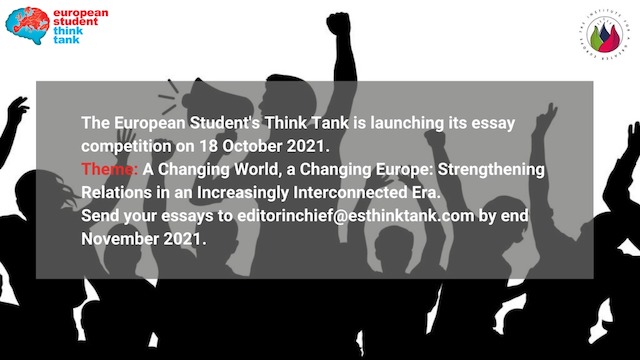Last week the Dutch Parliament was scheduled to discuss the budget for the Dutch foreign policy. Due to the horrific attacks in France, another plenary debate was scheduled on the growing threat of terrorism and the Dutch approach to handling ISIL. The EST’s Secretary Sietse Blom shares his views and insights on the budget discussion and debate in the Dutch Parliament.

Firstly, it may be useful to briefly describe the role of the Dutch House of Representatives and the Senate. The latter consists of 75 members, who are mostly not full-time politicians. They, in contrast to the 150 members of the Dutch House of Representatives, fulfil another side job most of the time. The elections for the Senate are indirect: the voters elect the members of the Provincial Councils, which in turn elect the members of the Senate. The Senate formally only has legislative power. They can either vote on approving or disapproving a new law. Because our current government only has a majority in one of the two Houses, passing legislation becomes difficult at times. The House of Representatives consists of full-time politicians, who are elected directly by the Dutch electorate.
It had been only yesterday that I visited the Senate, which is situated next to our House of Representatives. In the Senate, the supervisor for my traineeship at Cordaid and I met with a very inspiring Senate member for Democrats’66, Petra Stienen, to speak about the current budget cuts on development aid.This trip to the Senate was my first, as was the one to the House of Representatives the day after. The building was situated among other jewels in the city heart of The Hague. The security was strict, comparable to airports. Going up the stairs I noticed the ‘bridge’, an area where politicians and press meet, but that is not accessible for visitors. It had a certain appeal to me.
When I entered the public platform I noticed few people were interested in these budget discussions. Some people from the press were sitting in the front, and every five minutes a group of children entered to catch a short glimpse of the politicians in their duelling arena. With my laptop on my lap, and block note beside me I began watching attentive to write down interesting comments or questions (the ones relevant for Cordaid).
The first day of the budget for the Dutch foreign policy was discussed was filled with questions. A lot of questions. People from all parties could ask minister Koenders anything about his budget and about the course the cabinet would take on handling security, and the war on ISIL. Every new speaker started off with a brief statement about the terrorist attacks in Paris. The statements varied immensely. Van Bommel from the Socialist Party said the attacks were showing the vulnerability of our openness and freedom. However, he did not believe answering violence with violence was the answer. What he described sharply as: bombing them there won’t stop terrorist from bombing us here. Both options are not ideal.
Completely different approaches were mentioned by parties like the Party for Freedom of the Dutch political leader Geert Wilders. His colleague from the party, Van Roon, had a more ‘thorough’ way of dealing with the Muslims taking over Europe. And the refugees willing to spread the Islam here. He stated that the Islam does not belong in The Netherlands, our borders should be shut off and the bombing should be intensified. Even though I did not expect anything less coming from this party, it still surprises me how high the party is in the polls. Even with the current panic and call for secutiry. People very close to me support the party and call out things like bombing Mecca, sending the refugees back to fight in Syria and that the people fleeing here are wanting to make Europe an Islamic continent under Sharia law. This remains hard for me to accept that this is their genuine believe.
The members of Parliament all seemed looking for the right way of formulating their opinions, and stating what the best approach would be. Some díd speak wise words in my opinion, like Servaes from the Labour Party: we have to find a balance between another war on terror and going on peacefully with our lives. Or someone citing the EU’s foreign policy chef Federica Mogherini about her mention of Europe having to secure their outer, not their inner borders. And Europe having to address issues as one solid front, not as frightened nations by themselves.
In between, the politicians spoke briefly about Ukraine, and the association treaty with the EU. Also countries like Mali, where the Dutch play an active role, Burundi, Boko Haram and the budget for the UN were points of debate. All quite brief ones though. The debate was dominated by Paris and our ‘war with ISIL’, like prime-minister Mark Rutte described it after the attacks. The turbulent times were deeply emphasized during the debates in the Dutch political heart.

 The ’Ndrangheta’s Infiltration and Threat to European Institutions
The ’Ndrangheta’s Infiltration and Threat to European Institutions  From Paper to Practice: How Grassroots Norms Undermine Gender Rights in Pakistan
From Paper to Practice: How Grassroots Norms Undermine Gender Rights in Pakistan  Exploited Childhoods: The Role of Global Corporations in Perpetuating and Mitigating Child Labour
Exploited Childhoods: The Role of Global Corporations in Perpetuating and Mitigating Child Labour  Human Rights Challenges in Addressing SLAPPs in Media, NGOs and Journalism in the EU
Human Rights Challenges in Addressing SLAPPs in Media, NGOs and Journalism in the EU 